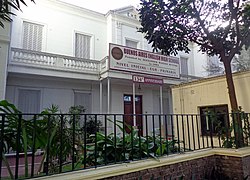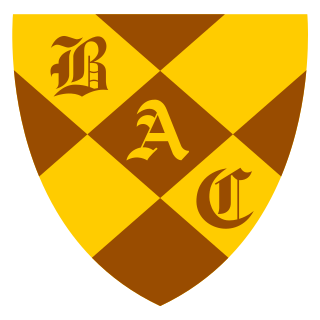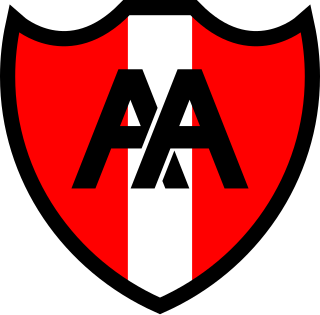
Asociación Alumni, usually just Alumni, is an Argentine rugby union club located in Tortuguitas, Greater Buenos Aires. The senior squad currently competes at Top 12, the first division of the Unión de Rugby de Buenos Aires league system.

The Argentine Football Association is the governing body of football in Argentina based in Buenos Aires. It organises the main divisions of Argentine league system, including domestic cups: Copa Argentina, Supercopa Argentina, Copa de la Liga Profesional, Trofeo de Campeones de la Liga Profesional and the Supercopa Internacional. The body also manages all the Argentina national teams, including the Senior, U-20, U-17, U-15, Olympic and women's squads. Secondly, it also organizes the women's, children, youth, futsal, and other local leagues.

Association football is the most popular sport in Argentina and part of the culture in the country. It is the one with the most players and is the most popular recreational sport, played from childhood into old age. The percentage of Argentines that declare allegiance to an Argentine football club is about 90%.

Lomas Athletic Club is an Argentine sports club from the Lomas de Zamora district of Greater Buenos Aires. One of Argentina's oldest clubs still in existence, Lomas is one of the four institutions that founded the "River Plate Rugby Championship" in 1899, The rugby union team currently plays in Primera A, the second division of the URBA league system.
1891 in Argentine football saw the first ever Argentine championship which was run by the Association Argentine Football (AAF) making Argentina's the oldest football league outside mainland Britain. This tournament was organized by the Argentine Association Football League which president was F.L. Wooley. This league only lasted one season, so in 1892 no championship was held. In 1893 other Association with the same name would be established by Alexander Watson Hutton becoming current Argentine Football Association.

Club de Gimnasia y Esgrima is an Argentine multi-sports club placed in the city of Buenos Aires. The institution is one of the oldest in the country, having been established in 1880. Gimnasia y Esgrima is also one of the largest clubs of Argentina, with around 30 different disciplines hosted in the three buildings that the institution owns in Buenos Aires.

The Saint Andrew's Scots School, also referred to as Saint Andrew's, is an Argentine bilingual school in Olivos, Vicente López Partido, Buenos Aires Province.

Alexander Watson Hutton was a Scottish teacher and sportsman who is considered "The Father of Argentine football". In 1893 he founded the "Argentine Association Football League". He also founded the Buenos Aires English High School and football club Alumni, which was the most successful Argentine team with 22 titles won until its dissolution in 1911.
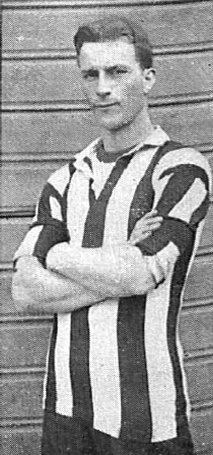
Arnold Pencliffe Watson Hutton was an Argentine footballer who played as a striker for Alumni and Belgrano A.C. As an international, he played for the Argentina national team.

Alumni Athletic Club, or simply Alumni, was an Argentine football team active during the first years of the sport in that country. Although officially founded in 1898, the team had been formed in 1893 when a group of students from the Buenos Aires English High School joined Alexander Watson Hutton to form a team in order to participate in the championship organized by the Argentine Association Football League.
Flores Athletic Club was an Argentine sports club from Flores, Buenos Aires. The club was pioneer in the practise of some sports that would become popular in Argentina, such as football, cricket, rugby union, polo, and tennis.

The 1891 Primera División was the first ever Argentine championship making Argentina's the oldest football league outside Continental Europe. This tournament was organized by the Argentine Association Football League whose president was F.L. Wooley. This league only lasted one season, so in 1892 no championship was held. In 1893 other Association with the same name would be established by Alexander Watson Hutton becoming current Argentine Football Association.
Club Sportivo Balcarce, or simply "Sportivo Balcarce", is an Argentine sports club located in Florida, Buenos Aires. Although other disciplines are held in the club, football was the most predominant sport while the senior squad was affiliated to the Argentine Football Association in the 1920s and 1930s.
The Liga Argentina de Football (LAF) was a dissident football association of Argentina that organised its own professional championships from 1931 to 1934. The Argentine Football Association did not recognise those championships until both associations were merged in 1934. Currently all the championships organised by the LAF are considered officials by the AFA.
St. Andrew's Athletic Club was a sports club established in Argentina by Scottish immigrants from the St. Andrew's Scots School, the oldest private school of Argentina.
Old Caledonians Football Club was a football club established in Argentina by a group of Scottish immigrants who were employees of British studio Batman, Parsons & Bateman, hired to build the main drainage in the city of Buenos Aires.
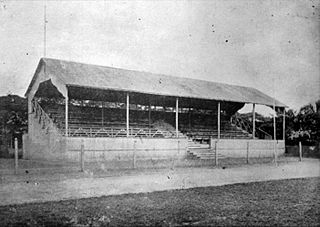
The 1913 Copa de Honor Municipalidad de Buenos Aires was the final that decided the champion of the 9th. edition of this National cup of Argentina. In the match, held in Ferro C. Oeste Stadium in Caballito, Buenos Aires, Racing Club beat Club Atlético Estudiantes 5–1, winning its second consecutive Copa de Honor trophy. On the other hand, it was the third and last Copa de Honor final played by Estudiantes, with no success.
Lanús Athletic Club was an Argentine sports club located in the Lanús district of Greater Buenos Aires.

